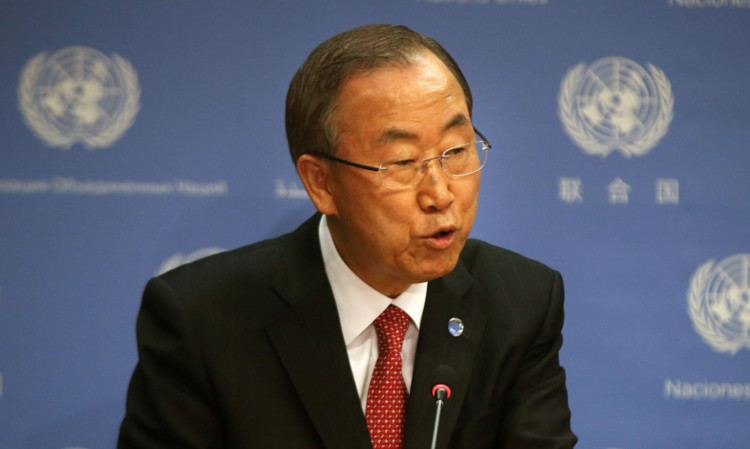Any “punitive” action against Syria for the alleged chemical weapons attack would be illegal without Security Council support or a sound case for self-defence, UN secretary-general Ban Ki-moon has warned.
The US and France have blamed Syrian president Bashar Assad’s regime for the alleged attack and are considering military action in response.
Such a strike would almost certainly occur without the approval of the UN Security Council as Russia and China have consistently used their veto power to block action against Assad’s regime.
The Obama administration in the US argues that a chemical weapons attack cannot go unpunished because of the council’s inaction.
Mr Ban said: “As I have repeatedly said, the Security Council has primary responsibility for international peace and security.
“The use of force is lawful only when in exercise of self-defence in accordance with article 51 of the United Nations Charter and or when the Security Council approves such action.”
He also warned that a military strike against Syria could unleash more turmoil and bloodshed in a crisis that has already killed more than 100,000 people.
He said: “I take note of the argument for action to prevent a future use of chemical weapons.
“At the same time, we must consider the impact of any punitive measure on efforts to prevent further bloodshed and facilitate the political resolution of the conflict.”
Mr Ban did not blame any party for the alleged attack on a Damascus suburb, saying “if confirmed, any use of chemical weapons by anyone under any circumstances will be a serious violation of international law and an outrageous war crime”.
“Whatever the source, this latest allegation should be a wake-up call for the international community,” he said.
He stressed an investigation by UN chemical weapons experts “is uniquely placed to independently establish the facts in an objective and impartial manner”.
President Barack Obama has received key support from leaders in the US Congress for a potential strike. The US government has said it has “high confidence” there was a gas attack and it was launched by the Syrian government.
US officials have also questioned the ability of the UN team to investigate properly, saying the inspectors faced too many delays getting on the ground and have a mandate only to determine if chemical weapons were used in the attack not who was responsible.
Mr Ban said biological samples collected by the inspectors will arrive in European labs for testing by Wednesday.
Meanwhile, Prime Minister David Cameron has confirmed he has no plans to go back to the Commons to seek to overturn his defeat over military action in Syria but insisted the setback does not mean he can “do nothing” to help those affected by the two-year civil war.
As the United Nations warned that a third of Syria’s population have been forced from their homes by the conflict, Mr Cameron pledged the UK will “lead the world” in ensuring humanitarian aid gets through.
He will use the G20 meeting of world leaders in Russia later this week to press for help for the refugees as well as progress on diplomatic efforts to secure a stalled peace conference.
The scale of the human toll of the two-year conflict which has claimed more than 100,000 lives came in the latest UN figures, which showed 1.8 million have fled to neighbouring countries in the last year, while another 4.25 million displaced within the country.
